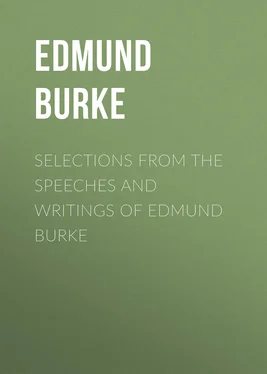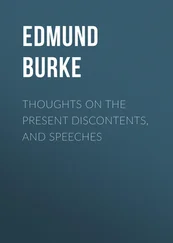Edmund Burke - Selections from the Speeches and Writings of Edmund Burke
Здесь есть возможность читать онлайн «Edmund Burke - Selections from the Speeches and Writings of Edmund Burke» — ознакомительный отрывок электронной книги совершенно бесплатно, а после прочтения отрывка купить полную версию. В некоторых случаях можно слушать аудио, скачать через торрент в формате fb2 и присутствует краткое содержание. Жанр: foreign_prose, История, Политика, literature_19, foreign_edu, foreign_antique, на английском языке. Описание произведения, (предисловие) а так же отзывы посетителей доступны на портале библиотеки ЛибКат.
- Название:Selections from the Speeches and Writings of Edmund Burke
- Автор:
- Жанр:
- Год:неизвестен
- ISBN:нет данных
- Рейтинг книги:4 / 5. Голосов: 1
-
Избранное:Добавить в избранное
- Отзывы:
-
Ваша оценка:
- 80
- 1
- 2
- 3
- 4
- 5
Selections from the Speeches and Writings of Edmund Burke: краткое содержание, описание и аннотация
Предлагаем к чтению аннотацию, описание, краткое содержание или предисловие (зависит от того, что написал сам автор книги «Selections from the Speeches and Writings of Edmund Burke»). Если вы не нашли необходимую информацию о книге — напишите в комментариях, мы постараемся отыскать её.
Selections from the Speeches and Writings of Edmund Burke — читать онлайн ознакомительный отрывок
Ниже представлен текст книги, разбитый по страницам. Система сохранения места последней прочитанной страницы, позволяет с удобством читать онлайн бесплатно книгу «Selections from the Speeches and Writings of Edmund Burke», без необходимости каждый раз заново искать на чём Вы остановились. Поставьте закладку, и сможете в любой момент перейти на страницу, на которой закончили чтение.
Интервал:
Закладка:
POPULAR OPINION A FALLACIOUS STANDARD
When we know, that the opinions of even the greatest multitudes are the standard of rectitude, I shall think myself obliged to make those opinions the masters of my conscience. But if it may be doubted whether Omnipotence itself is competent to alter the essential constitution of right and wrong, sure I am that such THINGS, as they and I, are possessed of no such power. No man carries further than I do the policy of making government pleasing to the people. But the widest range of this politic complaisance is confined within the limits of justice. I would not only consult the interest of the people, but I would cheerfully gratify their humours. We are all a sort of children that must be soothed and managed. I think I am not austere or formal in my nature. I would bear, I would even myself play my part in any innocent buffooneries to divert them. But I never will act the tyrant for their amusement. If they will mix malice in their sports, I shall never consent to throw them any living, sentient creature whatsoever—no, not so much as a kitling, to torment.
ENGLISH REFORMATION
The condition of our nature is such, that we buy our blessings at a price. The Reformation, one of the greatest periods of human improvement, was a time of trouble and confusion. The vast structure of superstition and tyranny, which had been for ages in rearing, and which was combined with the interest of the great and of the many, which was moulded into the laws, the manners, and civil institutions of nations, and blended with the frame and policy of states, could not be brought to the ground without a fearful struggle; nor could it fall without a violent concussion of itself and all about it. When this great revolution was attempted in a more regular mode by government, it was opposed by plots and seditions of the people; when by popular efforts, it was repressed as a rebellion by the hand of power; and bloody executions (often bloodily returned) marked the whole of its progress through all its stages. The affairs of religion, which are no longer heard of in the tumult of our present contentions, made a principal ingredient in the wars and politics of that time; the enthusiasm of religion threw a gloom over the politics; and political interests poisoned and perverted the spirit of religion upon all sides. The Protestant religion in that violent struggle, infected, as the Popish had been before, by worldly interests and worldly passions, became a persecutor in its turn, sometimes of the new sects, which carried their own principles further than it was convenient to the original reformers; and always of the body from whom they parted: and this persecuting spirit arose, not only from the bitterness of retaliation, but from the merciless policy of fear.
It was long before the spirit of true piety and true wisdom, involved in the principles of the Reformation, could be depurated from the dregs and feculence of the contention with which it was carried through. However, until this be done, the Reformation is not complete; and those who think themselves good Protestants, from their animosity to others, are in that respect no Protestants at all.
PROSCRIPTION
This way of PROSCRIBING THE CITIZENS BY DENOMINATIONS AND GENERAL DESCRIPTIONS, dignified by the name of reason of state, and security for constitutions and commonwealths, is nothing better at bottom, than the miserable invention of an ungenerous ambition, which would fain hold the sacred trust of power, without any of the virtues or any of the energies that give a title to it: a receipt of policy, made up of a detestable compound of malice, cowardice, and sloth. They would govern men against their will; but in that government they would be discharged from the exercise of vigilance, providence, and fortitude; and therefore, that they may sleep on their watch, they consent to take some one division of the society into partnership of the tyranny over the rest. But let government, in what form it may be, comprehend the whole in its justice, and restrain the suspicious by its vigilance; let it keep watch and ward; let it discover by its sagacity, and punish by its firmness, all delinquency against its power, whenever delinquency exists in the overt acts; and then it will be as safe as ever God and nature intended it should be. Crimes are the acts of individuals, and not of denominations; and therefore arbitrarily to class men under general descriptions, in order to proscribe and punish them in the lump for a presumed delinquency, of which perhaps but a part, perhaps none at all, are guilty, is indeed a compendious method, and saves a world of trouble about proof; but such a method, instead of being law, is an act of unnatural rebellion against the legal dominion of reason and justice; and this vice, in any constitution that entertains it, at one time or other will certainly bring on its ruin.
JUST FREEDOM
I must fairly tell you, that so far as my principles are concerned, (principles that I hope will only depart with my last breath), I have no idea of a liberty unconnected with honesty and justice. Nor do I believe that any good constitutions of government, or of freedom, can find it necessary for their security to doom any part of the people to a permanent slavery. Such a constitution of freedom, if such can be, is in effect no more than another name for the tyranny of the strongest faction; and factions in republics have been, and are, full as capable as monarchs of the most cruel oppression and injustice. It is but too true, that the love, and even the very idea of genuine liberty is extremely rare. It is but too true, that there are many whose whole scheme of freedom is made up of pride, perverseness, and insolence. They feel themselves in a state of thraldom, they imagine that their souls are cooped and cabined in, unless they have some man, or some body of men, dependent on their mercy. The desire of having some one below them descends to those who are the very lowest of all,—and a Protestant cobbler, debased by his poverty, but exalted by his share of the ruling church, feels a pride in knowing it is by his generosity alone that the peer, whose footman's instep he measures, is able to keep his chaplain from a gaol.
ENGLAND'S EMBASSY TO AMERICA
They enter the capital of America only to abandon it; and these assertors and representatives of the dignity of England, at the tail of a flying army, let fly their Parthian shafts of memorials and remonstrances at random behind them. Their promises and their offers, their flatteries and their menaces, were all despised; and we were saved from the disgrace of their formal reception, only because the congress scorned to receive them; whilst the state-house of independent Philadelphia opened her doors to the public entry of the ambassador of France. From war and blood we went to submission; and from submission plunged back again to war and blood; to desolate and be desolated, without measure, hope, or end. I am a Royalist, I blushed for this degradation of the crown. I am a Whig, I blushed for the dishonour of parliament. I am a true Englishman, I felt to the quick for the disgrace of England. I am a man, I felt for the melancholy reverse of human affairs in the fall of the first power in the world.
HOWARD, THE PHILANTHROPIST
I cannot name this gentleman without remarking that his labours and writings have done much to open the eyes and hearts of mankind. He has visited all Europe,—not to survey the sumptuousness of palaces, or the stateliness of temples; not to make accurate measurements of the remains of ancient grandeur, nor to form a scale of the curiosity of modern art; not to collect medals, or collate manuscripts:—but to dive into the depths of dungeons; to plunge into the infection of hospitals; to survey the mansions of sorrow and pain; to take the gauge and dimensions of misery, depression, and contempt; to remember the forgotten, to attend to the neglected, to visit the forsaken, and to compare and collate the distresses of all men in all countries. His plan is original; and is as full of genius as it is of humanity. It was a voyage of discovery; a circumnavigation of charity. Already the benefit of his labour is felt more or less in every country; I hope he will anticipate his final reward by seeing all its effects fully realized in his own. He will receive, not by detail, but in gross, the reward of those who visit the prisoner; and he has so forestalled and monopolized this branch of charity, that there will be, I trust, little room to merit by such acts of benevolence hereafter.
Читать дальшеИнтервал:
Закладка:
Похожие книги на «Selections from the Speeches and Writings of Edmund Burke»
Представляем Вашему вниманию похожие книги на «Selections from the Speeches and Writings of Edmund Burke» списком для выбора. Мы отобрали схожую по названию и смыслу литературу в надежде предоставить читателям больше вариантов отыскать новые, интересные, ещё непрочитанные произведения.
Обсуждение, отзывы о книге «Selections from the Speeches and Writings of Edmund Burke» и просто собственные мнения читателей. Оставьте ваши комментарии, напишите, что Вы думаете о произведении, его смысле или главных героях. Укажите что конкретно понравилось, а что нет, и почему Вы так считаете.












